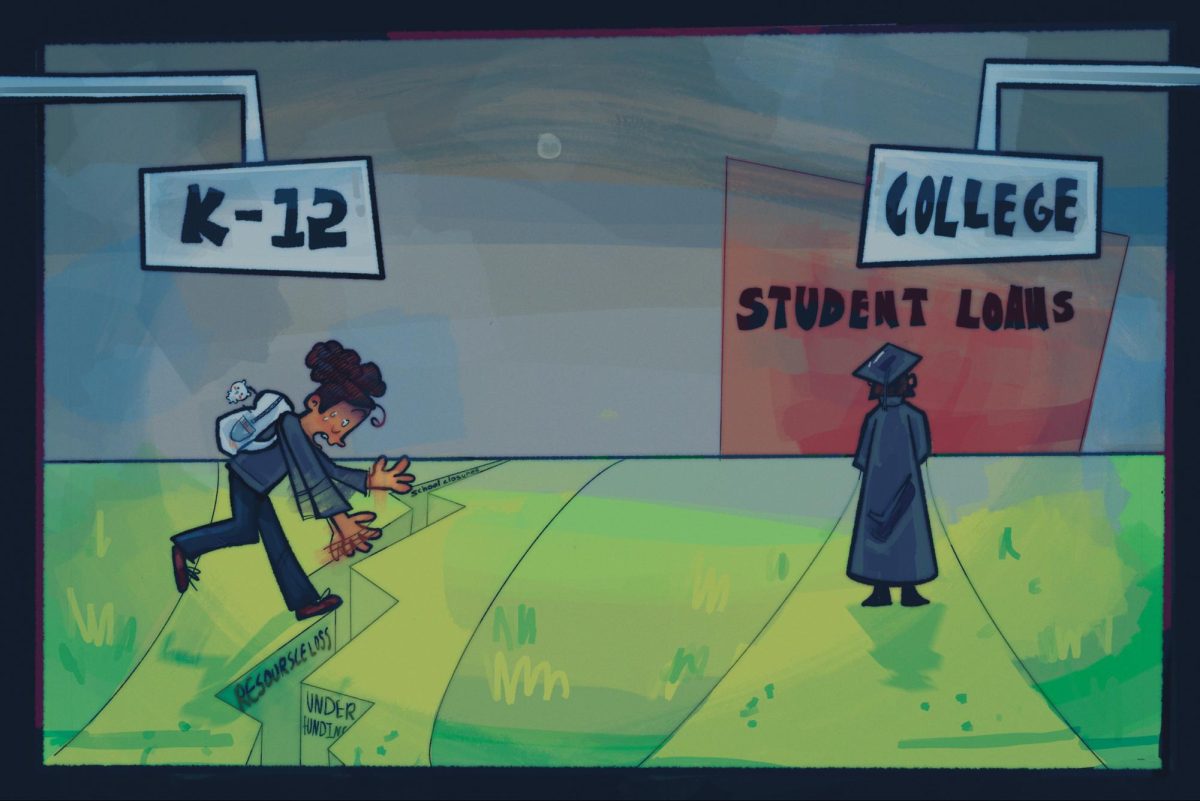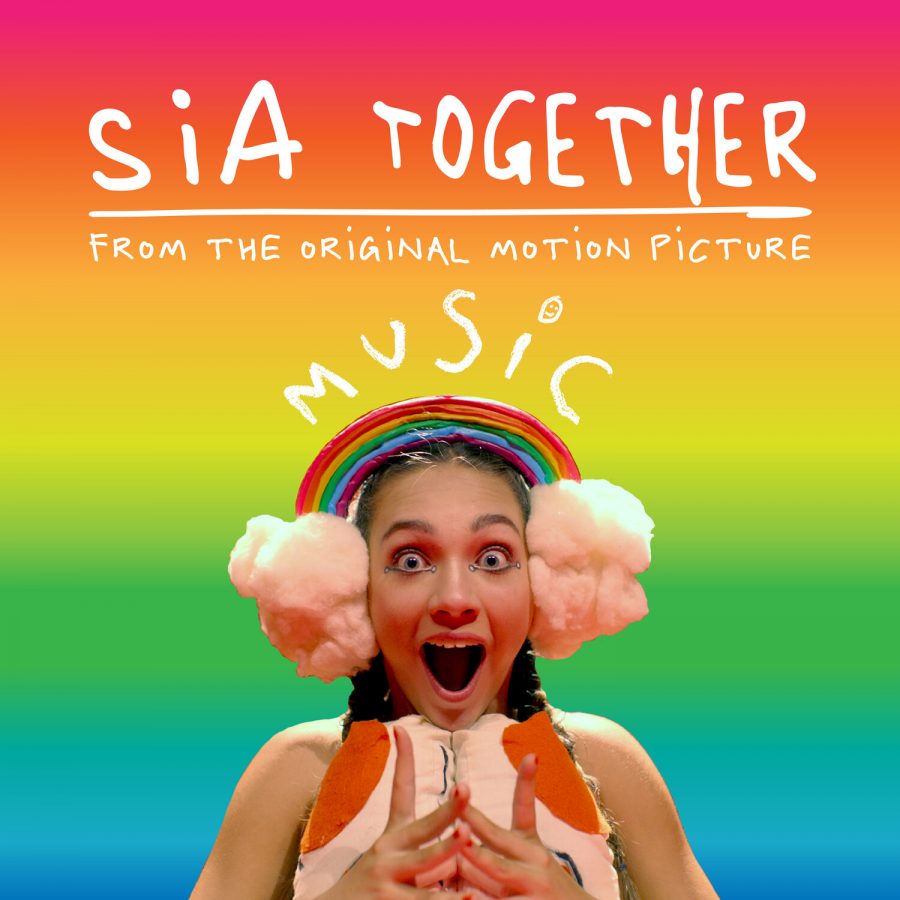Sia’s Ableism: “Autistic people can do anything!—except act in my movie”
A MISGUIDED “LOVE LETTER”: Maddie Ziegler gapes at the camera with wide eyes as she attempts to mimic austistic body language in Sia’s movie “Music,” a supposed “love letter” to the autistic community.
March 9, 2021
On the surface, singer-songwriter Sia’s movie “Music” is a promising directorial debut that champions awareness for the autistic community as well as the caregivers who support the disabled. But a quick investigation into the public’s negative reaction to “Music” reveals an alarming amount of ableism for a movie that is meant to support inclusivity.
The film attempts to portray the world from the perspective of Music (Maddie Ziegler), an autistic girl who cannot express herself through words but possesses a vivid mind, shown through musical-like sequences throughout the film. While the character’s premise isn’t inherently harmful, the musical scenes are excessively childlike, placing Music in a cartoonish interior world filled with abstract dancing, glaring colors and bizzare sets. It almost seems to be a deranged, neurotypical fantasy of how autistic people think, perpetuating the idea that people with autism live in an unhinged reality of their own. Featuring loud music and flashing lights, the musical scenes can also be extremely overwhelming for those on the spectrum—many of whom have sensory processing disorders—which is fairly ironic considering that the movie is meant to be enjoyed by the autistic community.
Furthermore, Ziegler herself is not autistic, which inherently makes her acting more likely to be seen as a mockery of austistic people. Although the actor stated she studied documentaries and YouTube videos about autism to prepare for her role as Music, her imitation of autistic behavior comes across as robotic, and it’s uncomfortable to see her mouth constantly gaping open with a grin and other over-the-top facial expressions.
“It is deeply reminiscent of the exaggerated mannerisms non-autistic people often employ when bullying autistic & developmentally disabled people for the ways we move,” autism advocacy group The Autisticats said on Twitter. “It’s unsettling and insincere.”
Ziegler’s performance is indicative of an even more severe matter. Sia stated through Twitter that she wished to “lovingly represent the [autistic] community” but portrays autism in a performative, tone-deaf fashion, and it appears that no research was done to ensure that autistic people would be represented in a respectful manner. Instead, the movie practically goes out of its way to reinforce the harmful stereotype that autistic people are brainless and infantile, and it leaves us questioning if Sia truly had the intention to support the autistic community.
Casting an autistic person for the role would have been a less dehumanizing approach; after all, the best way to create fair representation is to allow people to represent themselves. Yet, Sia claimed that the austistic actors she hired were unable to manage the role, stating on Twitter that “casting someone at [Music’s] level of functioning was cruel, not kind.”
In response, many autistic actors stated that they would have been able to handle the role, and that, as a non-disabled person, Sia did not have the authority to make such a judgement. Furthermore, Sia could have modified the role to support the actor rather than choosing another, non-autistic actor. Ruderman White Paper found that while the disabled account for almost 20% of the U.S. population, fewer than 2% of characters are disabled on screen. Of those, 95% are played by able-bodied actors. For a movie that claims to support those with autism, it’s rather counterintuitive to take away opportunities from disabled actors who already face heavy discrimination in the media and job industry.
With Music as the namesake of the movie, it is also saddening to see how little she evolves as a character. As the movie progresses, the storyline shifts focus to the able-bodied Zu (Kate Hudson), Music’s sister, who uses Music as a catalyst for her own self-growth. While Zu learns the true meaning of family, love and fulfillment, it comes at the expense of Music, who is depicted as a burden that Zu had to overcome.
Another point of contention surrounds the scenes where Music is held down through prone restraint, an unnecessary and dangerous practice that has been heavily opposed by the autistic community. After viewers demanded that these scenes be removed from the movie, Sia tweeted several explicit statements expressing her anger toward the complaints. She eventually deleted her Twitter account and apologized for the restraining scenes, saying they will be removed “from all future printings.”
Although Sia has expressed regret for the movie’s content, her initial reactions to criticism are concerning. Rather than respectfully addressing public opinions, she rushed to defend herself and belittled those who spoke up against the misrepresentation of the autistic community, revealing a blatant lack of consideration for the group that she claimed to support.
Despite all the public backlash, the film still managed to pick up a Golden Globe nomination for Best Motion Picture Musical or Comedy, and Hudson was also nominated for Best Actress in a Musical or Comedy. Unsurprisingly, neither nomination won.
Truthfully, the music and visual qualities of the film aren’t terrible—if judged on their own. But as the results of the Golden Globes indicate, the context behind “Music” makes it impossible to enjoy or praise the movie, much less award it with global recognition.
All in all, Sia’s “Music” is extremely insensitive, tone-deaf and disrespectful toward the disabled. Regardless of how well-intentioned Sia claims to be, the appalling lack of research and concern for the autistic community marks this unpleasant movie as a complete and total failure to create an inspiring piece of work.


























































